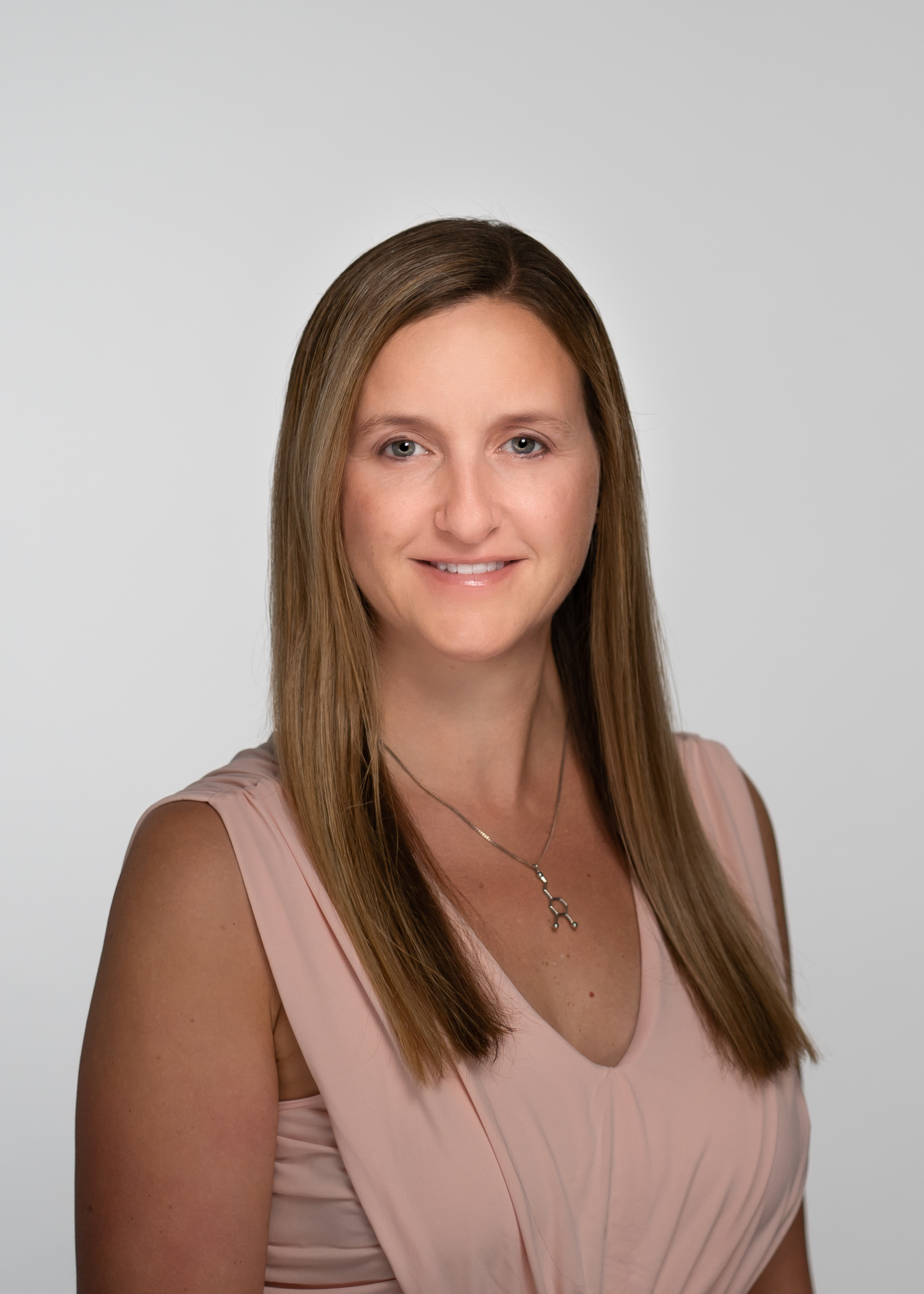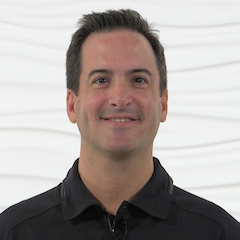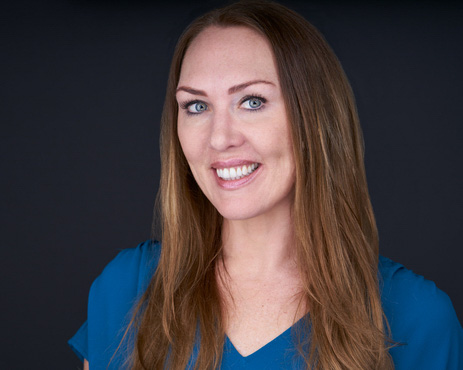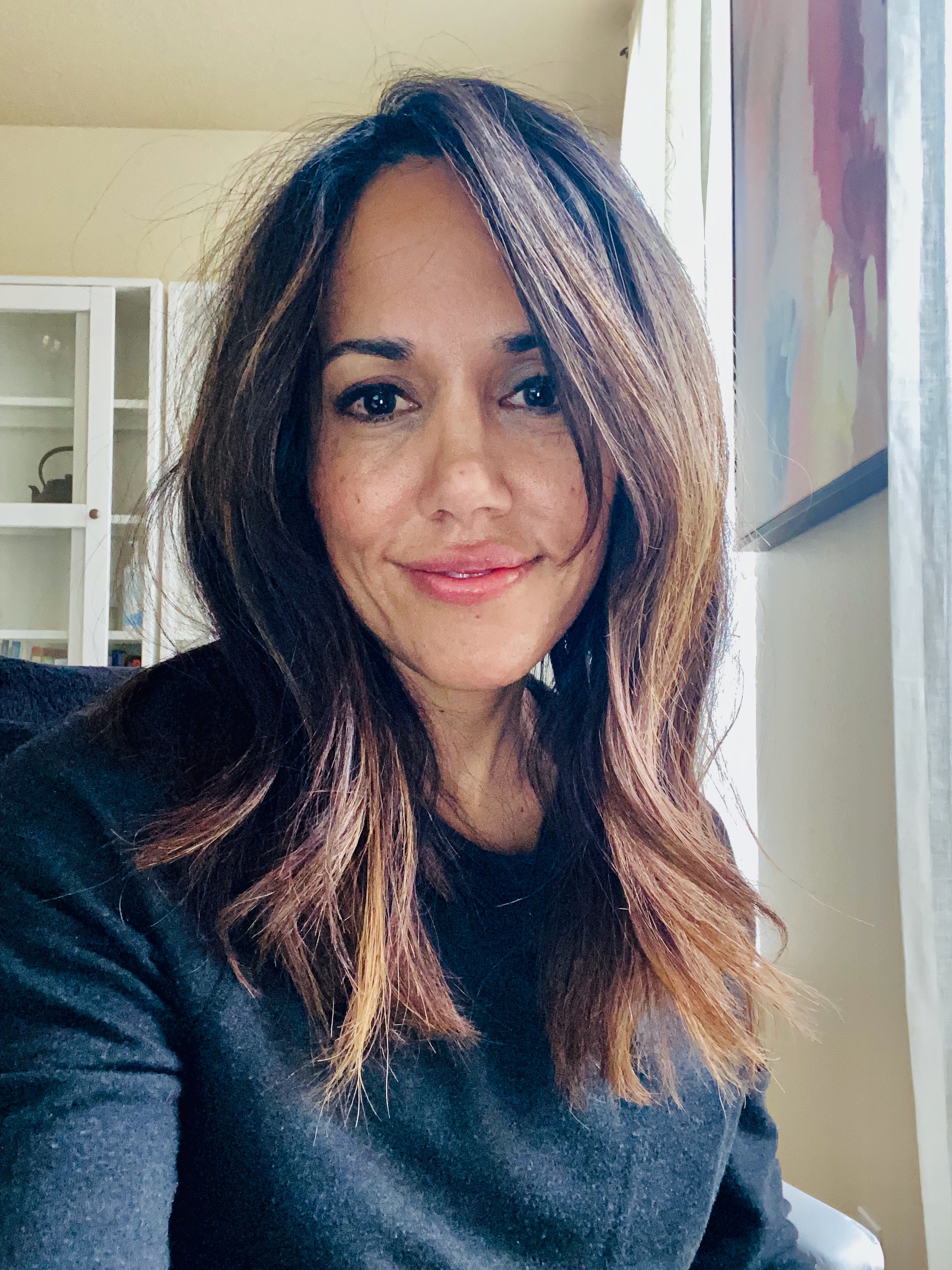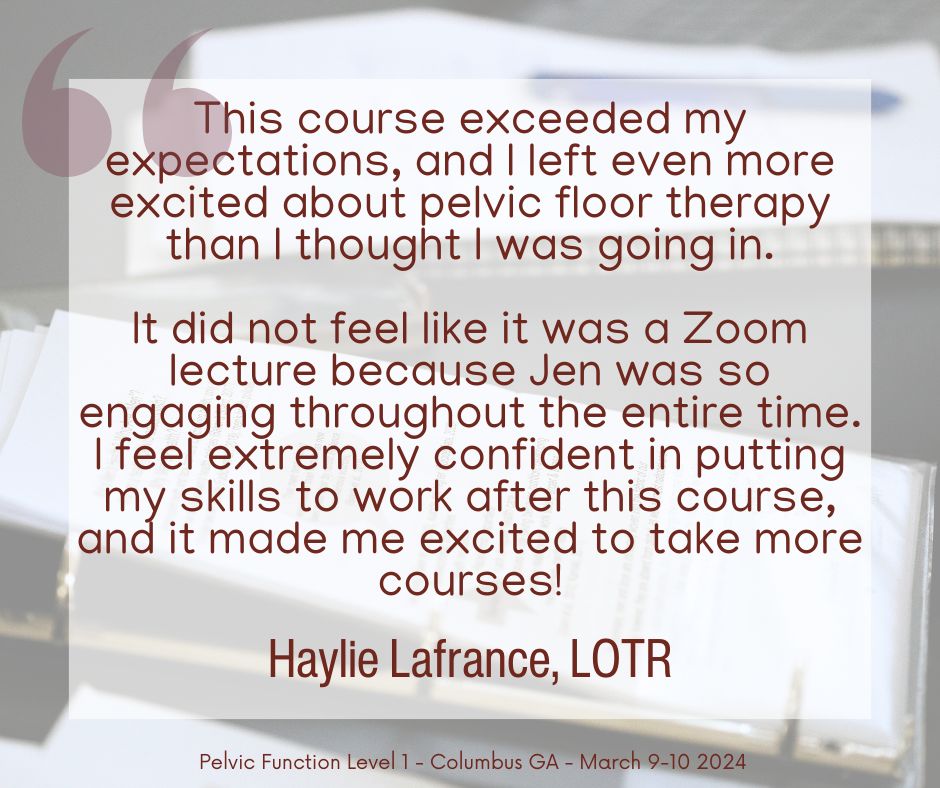Great course & great TAs. Ensured we all were understanding, open to explaining over and over, trying different techniques if necessary. As comfortable and mindful environment given the first encounter of Pelvic Exams.
- Brittaney Sargent, OTD, OTR/L - Lutz, FL
I feel so blessed to have taken this course.
- Jessica Stipp, DPT - Lafayette, IN
Thank you for facilitating wonderful courses!
- Paige Groetken, OTS - LeMars, IA
Great course! Created a calm environment during labs for max comfort.
- Stephanie Richter, PT, DPT - Olivette, MO
It was so much better than I was expecting & made me feel like I was prepared to treat Pt’s in the clinic.
- Tina Chickering, DPT - Harlan, IA
The instructors were amazing and I feel confident treating pelvic rehab patients after this course. Looking forward to taking more Herman & Wallace courses!
- Abby Mathis, OTR/L - Louisville, NE
So great! Learned a ton and felt empowerment to apply it to help men, women & children with pelvic rehab. Thank you!
- Mara MacKinnon - Las Cruces, NM
This was an excellent & very thorough course. I was never bored nor wished that the day was over, actually I’m quite sad to be done. I feel well equipped to start this area of PT & excited to come back for more classes.
- Sydney Greenlund, PT, DPT - West Des Moines, IA
Everyone including the TAs, were great, knowledgeable & easy to talk to/ask questions. Everything was very organized.
- Lindsi E. Johnson, MS, OTR/L, ATP - Springfield, MO
This course has ignited a file for being a PT that we thought was gave forever! The evaluation and treatment of the pelvic floor pf1 is an excellent course. We have gained much knowledge and can’t wait to get into the clinic and start treating patients! There is such a need for this week in my community and we are excited to be able to offer help to my patients. Thank you!
- Michelle Fell - Mandeville, LA
Thank you, Heather for all your for Catchphrases and for sharing your personal experiences. I can’t wait to go home and watch your TED talk! Thank you, Sara, for all of your insights. I have used tour online content for education for a while now and I was so fun to meet you! Thank you all for sharing your clinical expertise!
- Christina Jensen DPT - Johnson City, TN
It would be beneficial for instructor to demonstrate on patient or through video of complete examination in parts then have us perform. It inspired the class and learns with a better understanding of diagnosis of treatment of pelvic floor dipfunctions.
- Amy Malone, PT, MPT, OCS - Gulfport, MS
Very educational and comprehensive. They made the course comfortable and flow well. I feel more knowledgeable about treating PF patients and know many resources to refer to for future questions about treatment and equipment.
- Alyssa Sonnier, SPT - Sulphur, LA
This was my first introduction to Pelvic Floor assessment and treatment. I had little idea of what to expect. I knew there would be an internal lab, and that was daunting to me. However, upon the start of the first lecture, Sara and Heather made the classroom environment so comfortable and professional feeling. They explained the information incredibly thoroughly and provided the best information. I feel prepared to work with patient, and motivated to continue to learning Herman & Wallace! Thanks!
- Kelsey Graham, OTR/L - Oxnard, CA
I though this course was amazing! Such good information presented during the course. Very professional presentation. Excited to keep taking Herman & Wallace courses!
- Catherine Sink, PT, DPT - Johnson City, TN
I absolutely loved this course. I have learned so much about pelvic floor PT and my own Pelvic Floor PT and in general. I look forward to continuing learning through the rest of the Heran & Wallace courses.
- Caroline McDaniel, SPT - Indianola, MS
Thank you for being so passionate about what you do and passing that onto me!
- Ilia Henderson, PTA - Statesville, NC
I was very impressed by the content & structure of this course. The cost was definitely worth the experience! The instructors did a fabulous job presenting the information and keeping the student engaged. They created a comfortable and safe environment. I 10/10 recommend H&W And I look forward to attending my next course!
- Alex Widcamp, SPT - Westlake, LA
Very interactive and engaging course! Instructors & TAs were all very knowledgeable & helpful throughout the entire weekend! 10/10 recommends this course to anyone wanting to explore pelvic health physical therapy.
- Arianna Robichaux, SPT - River Ridge, LA
Amazing course – knowledgeable instructors and aids. I plan to attend other courses in future!
- Allyson Andreini, SPT - Long Beach, CA
I feel like this course re-kindled my passion for physical therapy and presented as excitement to start treating my patients on Monday! Thank you so much for what you all do!
- Severa Calzada PT, DPT - Katy, TX
I absolutely loved this class and got so much more out of it than I thought I would (and I thought I would get a lot!) The presenters were incredibly engaging and encouraging and made me feel like they genuinely wanted to help in every way to help the class. I didn’t feel like they were just reading power of slides, but provided a wealth of info and I can’t wait to take my next class.
- Sophie Ivy PT - Katy, TX
I feel confident & prepared to educate & treat my patients. I’m in an underserved area & I feel like I have the tools to make a big import in my community. My pelvic health education in grad school was a power point presentation. So I feel much more knowledge and more comfortable treating this population.
- Dr. Kaitlyn Owen, PT, DPT - Nogales, AZ
Great course, Very informative! I learned so much that I didn’t know that will help me to better treat my patients. I also learned so much about myself. Thank you!
- Aimee Anthony, PT, DPT, OCS - Kenner, LA
I learned a lot – it was a bit overwhelming, but everyone was really helpful and then the managing movement is really helped organized. Thank you, I feel ready for work!
- Rachel Koebel, PT, MPT, GCS - South Milwaukee, WI
I absolutely loved the course instructors. They were both entertaining and informative.
- Rachael Paszko, PT, DPT - Asheville, NC
Amazing course & instructors were amazing! This course got me excited to treat new PTs.
- Victoria Aspell, PT, DPT - Chelmsford, MA
Great examples related to content. Had fun ways to remember material. Supportive teachers/Mentors/TAs. Had good supporting evidence (research).
- Kristina Anwyll, SPT - Manchester, NH
I can’t express how incredible this course has been. I am amazed at the amount if information. I learned of how many additional “tools” I have after this weekend. I found all the research, references, referrals, books, websites etc. also extremely helpful and will be such a great resource.
- Christina Warne - Dover, NH
Very informative/clear. Good pace. Comfortable environment. Excellent teachers. Professional but still personal (Maintain sense of humor). Cool as a student to hear from practicing people from different specialties.
- Leah Connerty, SPT - Manchester, NH
This course was exactly the level of knowledge. I needed to grow my interest in Pelvic Floor PT. I am excited to see where it takes me in my career, and I love that I learned so much about my own body.
- Alisha Carter, SPT - Manchester, NH
I feel confident to expand my practice and serve a needy population after taking this class. Everyone was incredibly welcoming and inclusive. Knowledge base of instructors was remarkable.
- Sharon Godbout, PT, DPT - Beverly, MA
This class was fantastic. The content was interesting and presented clearly. I learned a lot more than I expected to learn!
- Sarah Cline, SPT - Manchester, NH
Great course – feel comfortable navigating the female pelvic floor & w/ my knowledge of course & tx of V1, PFMT, & various DX.
- Alicia Tavares, SPT - Manchester, NH
I truly loved my experience and I am so glad I signed up for pelvic Level 1. Great overall educational experiences.
- Jessie Andoscia, PTA - Exeter, RI
The instructors in this course were absolutely AMAZING. Course content was relevant and user friendly.
- Nicole Rogers - Wasilla, AK
Thank you! This was amazing!
- Sarah Coggins - Waterbury, VT
As a student, this course taught me a lot about the pelvic floor that is missing from out curriculum. The speaker enthusiasm made me feel like this is a real in I could work in.
- Arin Lotter, SPT - Manchester, NH
This was a very intense course for me. It opened my eyes wide to the depth of PF health. I am forever changed. I hope to continue learning in order to help others and (as I found out this weekend) help myself.
- Jacqueline Richards, PT, DPT, ATC - Chestertown, MD
I feel so empowered for my patients and for myself learning this course. The instructors were so great at hands on teaching all the techniques as well as teaching practitioners how to facilitate trust and comfort ability during pelvic muscle exams. Pany and Amanda complement one another and are a knowledge power house. I am learning feeling motivated and competent in the beginning stages of pelvic floor therapy. I am so glad I came!
- Alexis Henderson, OTR/L, CLT, OCC - Newport, VA
Excellent course w/ excellent instructors!
- Kayla Thompson, Physical Therapist - Midlothian, VA
I enjoyed this course a lot! My interest in pelvic health only continues to grow. As a student still, I did not feel treated as a student, I was treated as a equal and loved getting to learn from everyone! Thank you Amanda and Pany as well as Megan, Brittany & Emily for your knowledge and assistance throughout this course!
- Allyson Kuhn, SPT - Leesburg, VA
I was thorough impressed with how open and inclusive this course was. Pany’s testimony about diversity and being inclusive was very heartfelt and genuine; it almost brought tears to my eyes! I felt very accepted in the practice everything in the course. I took level 1 with another company and this was exponentially more in-depth, inclusive, and comprehensive. Definitely taking more! Thanks again Pany and Amanda for being so awesome. Pany’s light heated attitude is great and I loved listening to her.
- Matthew Harville, PT, DPT - Richmond, VA
Instructors/Aides were great! Felt incredibly encouraged and supported throughout the weekend!
- Jamie Coon, PT, DPT - Midlothian, VA
This class was one that I got very nervous about in the weeks leading up, but I’m so glad I signed up. I feel like it did teach me so much and not just about the PF. All of the practice was very helpful. But still feel somewhat low in confidence to turnaround of treat tomorrow.. but I know I’ll get there. The instructors and lab assistants so helpful during labs and always were able to spend adequate time with us. (Great idea to have lab assistant here, by the way!) Thanks for a great course!
- Jessica Skeeter PT, DPT - Chesapeake, VA
This course was so well done, covered a variety of diagnoses and provided a safe, professional environment for us to transform our educations.
- Sarah Houhoulis, DC - Silver Spring, VA
All of the instructors were great. Labs were really helpful.
- Kali Meadows, PT - Norfolk, VA
I was so nervous before this course! But, by lunch time on the first day, I felt so empowered and excited to learn more and help women with pelvic floor rehab.
- Cynthia Gallup LPTA - Virginia Beach, VA
Great Course! One of the best. I have DN and OCS certification and this course was most well-received. All instructors and TA’s helped us feel comfortable and confident. I’m ready for my next (2B in NJ). Thank you!
- Maricel Briones, DPT, CMTPT, OCS - Virginia Beach, VA
The instructors were very knowledgeable and helpful. They provided a great learning environment and were able to answer all questions. They are all very passionate about Pelvic Floor. I highly recommend this course.
- Sarah Valentine PTA - Norfolk, VA
Thank You! This has been such a great weekend.
- Sara Foster, PT, DPT, CFMT - Salida, CO
Absolutely fantastic instructors and lecture presentations. The time in lab was crucial to solidify the skills.
- Michelle Laging PT, DPT - Denver, CO
Amazing course! Jessica was passionate about Pelvic Health PT and made the course fun and informative! Would take a course with Jessica again!
– Jasmine Garth, PT, DPT, Cert. DN - Colorado Springs, CO
I got tons of information and feedback to help me start my PF path!
- Katie Peters, PT, DPT - Denver, CO
Exceeded expectations. Jessica made an anxious learning experience very comfortable.
- Kelly Knott, PT DPT - Woodland Park, CO
Great course! Instructor made the material easy to learn and put together the entire process.
- Sarah Kemak,PTA - Avon, CO
This was great! Felt very comfortable.
- Tanaye Maez - Center, CO
Jessica and the TAs were absolutely incredible. They were so knowledgeable about the material and helpful during the lab portion. I was very appreciative to have a small TA to student ratio as someone was always accessible when I have questions.
- Hunter Rich, PT, DPT - Dundee, MI
This is my 1st H&W course and I was thoroughly impressed with Jessica’s knowledge and teaching style. Thank you for a fantastic course an inspiration and confidence to treat PF pts.
- Jennah Jones, PT, DPT, COMT - Buena Vista, CO
Excellent and clear presentation of concept, dx, treatments and evidence. All questions and concern addressed.
- Jordan Lenkin, SPT - Denver, CO
Loved the course! The evidence-based evaluation or treatment is as per all what I am currently learning in school! I feel very prepared for my Pelvic Floor Clinic.
- Angela Gonsalves, SPT - Fayetteville, NC
I am so glad I took this course. There is tons of great info on evaluation on treatment. The best part of this course was the instructor. They brought so much enthusiasm and knowledge each day!
- Cassandra Hippensteel PT, DPT - Gilbert, AZ
Both instructors were fabulous! I found the course to be very helpful and feel comfortable evaluating a pelvic floor now. The TA’s were all great and answered all my questions well. Thank you!
- Brianna Irion, PT, DPT - Kalispell, MT
The instructors and lab assistances were beyond helpful and incredibly knowledgeable. They went above and beyond to further our education and were very thorough with the information.
- Alexandra Shipley - West Chester, OH
Truly gained a confident understanding in the female/male anatomy and the treatment for females. Feel comfortable going forward in treating patients!
- Kristin Brastad - Chino, CA
Amazing course, Great instructors.
- Samantha Moon, DPT - Ponte Vedra, FL
As a student, I felt prepared to take the course from my prior course work. Instructors made myself feel comfortable and also challenged my thought process with course content.
- Randi Henriques, SPT - Upland, CA
Very clearly presented info. Very practical. Instructor reinforced techniques/info presented from day 1-3 and labs helped put all info together. Lab assistants were fantastic – help was always available.
- Lisa Loveless - Strongsville, OH
The content of the course is wonderful and so comprehensive. I started the course with very little knowledge of the Pelvic Floor and now I feel confident that I can evaluate and treat Pelvic Floor patients. The instructors were so knowledgeable, professional and inclusive. It was a wonderful learning experience!
- Makenzie VanWinkle OTDR/L - Mesa, AZ
This was a wonderful experience! As a PT student, I did not feel intimidated in the slightest. Everyone was very approachable, warm, helpful, knowledgeable and more! I am grateful for that! Thank you! I can’t wait for my next H&W course!
- Erin Tucker - Sacramento, CA
Great Course! The labs really helped to solidify the information.
- Laura Smith, MPT, CLT-LANA - Aptos, CA
I feel that Pelvic Floor Level 1 will really help my practice. I now have the tools to help my orthopaedic patients also that have unresolved “SI” or LBP. I think it is a good course for other orthopaedic PTs to take even if they are not going to specialize in Pelvic Health.
- Amanda Callaghan, PT, DPT, OCS - Stateline, NV
I love Molly! Great Lecturer!
- Shimeng Gao - Los Angeles, CA
I really appreciate the overall organization of the course, materials and order of presentation. The style of presenting, re-presenting and stacking concept made it an easy transition to seeing the big picture.
- Danielle Brooke Sanders, OT - Lafayette, LA
Amazing course! Good information! Good labs! Things you can use in clinic tomorrow.
- Agnes Feldoto - Hagersten
Excellent course content, Well presented. Excellent instructors with many personal examples of working with patient population very engaging, made a learning easy evidence based; great references for relevant studies.
- Sandra M Smith, PT - Orlando, FL
Thank you for being so inspiring and taking time to teach us changed/motivated me to be/do more. I was never taught pelvic floor in school and this was 1st exposure. I truly appreciate this and am excited to attend my next course.
- Sandra Walker, PT, DPT - Grand Rapids, MI
I truly enjoyed the course and plan to take the following course as well!
- Ashley N. Williams, PT, DPT - El Paso, TX
It was amazing how comfortable we got throughout the course very supportive.
- Paulette Swanson PT, DPT, MS - Melbourne, FL
This was a wonderful course that has made me excited to be specializing in such a rewarding area!
- Hana Grace James - Tupelo, MS
Loved it! I would like pictures bigger & not blurry.
- Mallory Lott - New Orleans, LA
This course encompasses a wide variety of conditions and has given me the confidence to begin a career in pelvic floor therapy.
- Abby Fitts PT, DPT - Anniston, AL
Great course so much valuable information. So excited to get started tx this population.
- Breanna Edenborough PT, DPT - Seminole, OK
Day 3 was one of the best as far as information & providing info for intervention. Part of that is the nature of the course however more information regarding treatment options for day 1 & 2 topics would be amazing. All in all it was a wonderful and empowering course. Thank you all for your patience and guidance; it was very inspiring!
- Danielle Shindler, PT, DPT - Houston, TX
Great course – great instructors & lots of positive energy. Loved it!
- Amy Hinkel, PT, MSl, MSR-PT - Southlake, TX
This was an excellent course with lots of relevant information. I would recommend this class to anyone interested in learning more about pelvic health.
- Carter Sonstein - St. Louis, MO
I am honestly shocked by how much we learned in such a short time & how much I retained! I know this is due to the teaching styles & set up of the course, & I am extremely grateful for that. I feel confident that I can at least start in this field. Now, which is really exciting. Looking forward to 2A & 2B & Capstone someday!
- Rachel Busch, PT, DPT - Englewood, CO
I personally think a lot of great info was presented on day 1 when most attendants were tired/brain fatigue. I wouldn’t mind having EMG Day 3 and move Day 3’s info to Day 2. Instructors were very welcoming and accommodating to me. Participants were also very accepting to me when performing lab techniques/session. Thanks for a great course!
- Jay Musial PT, DPT - Grand Junction, CO
Wow. Such an amazing course. I had the full range of emotions. I am still unsure if I can do it because it really affects me but I would like to and would like to help a wide population. Thank you for opening my eyes to the mew world of pelvic health.
- Jordan L. K. Malkowski, PT, DPT - Gillette, WY
As a physical therapist with no previous knowledge of pelvic floor health. This course was fantastic. Learning about this topic will help me greatly to help so many people.
- Renee Hogue, DPT - Artesia, NM
Great course! A Facebook page for either this course or prior course participants would be helpful as well as a video of the PF YMCA!
- Danielle Klein, PT - Hastings, NE
Thank you for empowering me to go out. Make a difference.
- Lauren Winely, SPT - Evansville, IN
This was a great course and the instructors were very knowledgeable and made it comfortable!
- Paige Slemmons DPT - Superior, WI
Can’t wait to start treating patients!
- Christa Antrim DPT - Albany, OR
You will leave this course feeling confident with bring able to examine and treat the pelvic floor!
- Kimberly Rogers, PT, DPT - Zion Crossroads, VA
Thank you for taking time this weekend to discuss this area _ us learned a lot and cannot wait to put this to practice!
- Trina Wunderlich, DPT - Huntsville, AL
I think if you can incorporate lab with the movement presentations on day 3 it would be easier to stay attentive. Overall the course was fantastic! Very accommodating to breast feeding / to allow pumping.
- Chelsea Muncy - West Chester, OH
This was absolutely wonderful! I feel ready to begin clinical work in this field even though I will be on my own in my area.
- Sarah Warren, PT, DPT - Rock Springs, WY
It was a better and cure than the expected.
- Emily Minton, PT, DPT - Tynan, TX
Excellent flow and extremely fun, positive course! Loved the learning environment and encouragement.
- Michaela Ecklund, PT, DPT - Surprise, AZ
Excellent course! I can’t wait to start treating patients with pelvic floor dysfunction!
- Abbey Thornock, PT, DPT - Midland, MI
Very professional and informative instruction in a comfortable and pleasant environment for a very sensitive subject. Great Job!
- Ruth Hall, PTA - Cabot, AR
This course was amazing! I feel confident in assessing and treating general pelvic floor dysfunction.
- Rachel Duff, PT - Clinton Twp, MI
I went into this course very nervours, After first day I was very comfortable. The instructors were very knowledgeable and allowed everyone to feel respected and welcomed. I have a passion to help others and especially women and this course immediately heightened that passionate drive and stimulated my love for learning. Thank you for great weekend! I feel more empowered!
- Trina Winner PT, DPT, OCS, CLC - Versailles, OH
This class was so inviting, open and helpful to grasp beginner level knowledge of PF treatment. Everyone was so knowledgeable and kind and created a learning environment I looked forward to coming to each day! Plus, you make great connection with peers!
- Kara Weber, SPTA - Otsego, MI
I was very nervous coming to this course and within minutes the speakers Jen & Megan set me and everyone at ease making it a safe & wonderful experience. There was a lot of information but no pressure to know everything again making it a great learning experience. Thank You!
- Jennifer Cartier, DPT - Clarkston, MI
As a student PT, I was very nervous about attending this course due to lack of clinical experience. The instructors were so welcoming and helpful that I instantly relaxed. I learned so much this weekend and I am so excited to be able to apply this to much future practice!
- Emily Held, SPT - Mount Pleasant, MI
Highly recommended and inspiring course.
- Erina Miller - Dover, DE
This course was amazing and the instructor were amazing.
- Darlene Mowrey , DPT, PT, CMTPT - La Vista, NE
This is the first CE I’ve taken in 7 years that prepared me for examination and tx of a new topic. Very well organized.
- Michelle Anne Johnson, PT, DPT - Woodward, OK
These course instructors & Tas were fabulous. I was anxious to attend, based on the content of the class, but they made everyone feel so welcomed/comfortable.
- Teresa Durkin - Kansas City, KS
Demonstrations of exercises of a exercise instruction would be helpful.
- Kristin Overton, PT, DPT - Oakland, CA
Great course & very well-educated instructors.
- Whitney Ford, DPT - Hays, KS
Such a great class! Can’t wait to continue learning this important topic. As a pregnant participant who had to work in groups of 3’s, I difficult to get labs completed in the amount of time intended for 2 people.
- Amanda Satcher, OTR/L - Nashville, TN
Loved this course! I was so nervous coming in to the 1st day, but all of the instructors/TAs made this learning environment one that was so comfortable.
- Sarah Prejean, PT, DPT - Lafayette, LA
Loaded with useful information that will help a large portion of your patients. Well organized and useful/open/welcoming environment.
- Audrey Finer PT DPT - Algona, IA
Jen and Teri are amazing at providing this course with “real world” application – not just an educational course. Lots of support and supplemental help after the course offered.
Becka Bisset, PT DPT - East Lansing, MI
This is best owned class I’ve taken! Thank you for building confidence providing thorough knowledge and teaching pride/respect for our amazing bodies!
Katherine Thomas, PT, DPT - Grand Rapids, MI
I was nervous coming into this course. Being new to Pelvic Health Therapy as well as an OT. I was put at ease day1, I feel like this course is geared well for all practitioners and feel. I will be able to start using as soon as I return back to work to positively impact my patients.
Traci Lane Smith, OTR/L - Baton Rouge, LA
Excellent instructors and well-organized content. Lots of repetitions and practice learning intention. Great course! Highly recommended.
Kelly Cooke, PT, DPT - Loda, IL
As overwhelming as this course could have been, the instructors and assistants were amazing! They made you feel comfortable and beautiful and they validated your feelings.
Lindsay Richard, MOT, OTR/L - Baton Rouge, LA
Jen and Terri are excellent Teachers! Material is organized. Really like how you study on time.
Kristin Hoeh - Lewiston, MI
I was recommended by another pelvic floor therapist to face this course. This course exceeded all my expectations and made me super excited for this field!
Ashley Wejrowski, SPT - Midland, MI
I did not just quickly go through and circle 10’s – I genuinely mean every ‘10’ and I feel it would be wrong to grade any person/things any lower. Excellent, excellent course. Can’t wait to bring things to patients next week and build my existing practice. Can’t wait to attend a level 2 course next yr!
Bridget K. Gustwiller, PT - Defiance, OH
I was excited to take this course and learn more about the pelvic floor. I was also slightly temfied at the same time. The instructors made me feel comfortable and safe. I was able to relax and learn early on. Thank you!
Lisa LaMont PT - Auburn, MI
The course was highly organized, the content was useful and the speakers were excellent.
Carla Bennick, PT - Grand Haven, MI
Great class! Don’t suggest to buy anatomy book.
Heidi Lavrisha, PT, DPT – Montrose
Instructors knowledge and experience was amazing through content.
Abby Hescott - Grand Rapids, MI
I loved the managing movement sections, and getting us in our bodies / out of our chair. This brought the subject matter to life for me almost as much as the labs. Feeling like I’m on the brink of a whole new chapter of my career! Thank you!
Erica Rodas, MS, OTR/L - Charlestown, MA
Incorporate more PT’s like Erin – all instructors are great but we don’t get a lot of trauma ed 50. It was really nice.
Emma Recane, PT/s - Maynard, MA
More case study discussion would have been helpful.
Paulette Selimo, PT, DPT - Boonton Township, NJ
Makes me want to practice more and take PF2A-B! Nicely ties into whatever treatments we know and use.
Chelsea E Sweetman, PT, DPT - West Kingston, RI
PF1 course is a great course for a beginner into PF Rehab I have never learned anatomy so fast! I am ready to use the skills I learned this weekend with patients in a practice when the PF1 program is new.
Dr. Rupa Patel, PT, DPT - Middlesex, NJ
This course exceeded my expectations. I feel like, I have a solid base to jump into the next pelvic floor courses and I am excited to embark into the world of pelvic floor health. Thank you Dustienne and Lila.
Marisa C. Marino, pht, DPT - Brossard, QC
Very informative! Looking forward to learning more.
Rachel Gottesman, OTR/L - Willmington, DE
Being a student, I appreciated all the help and patience the assistants provided. Everything was easy to follow and all questions were answered.
Jennifer Student DPT - Waxhaw, NC
I come in with some knowledge, but leaving with more connected dots and increased knowledge.
Theresa Gavin PTA - York, PA
This course was fantastic. Definitely looking forward to PF2A and PF2B.
Erin Locati, PT, DPT - San Antonio, TX
Instructors each had a different style and both engaging and very knowledgeable. Easily approachable and genuinely willing to help.
Katherine O'Brien CNM - catonsville, MD
Absolutely the best course I have ever attended. So informational and thorough. All the instructors were so supportive and caring of our learning.
Sarah Elizabeth Cox, PT, DPT - Kill Devil Hills, NC
Loved working case load as a group instructor. The 2nd lab feet a little short could use more time. Demo lab was amazingly helpful (Instructor demo on one person)
Sonya Richardson, DPT, GCS - Oakland, CA
This was a great course and I can’t wait to take another course.
Lauren Borro PT, DPT, CMTPT - Bethesda, MD
The lab was more helpful when instructors directed the order of events. The instructors did a great job. I learned so much, I can’t wait for future classes.
Rachel Larson PT, DPT, CLT - Greenville, SC
I have taken other Pelvic Floor Courses and this course was much more in depth and greatly advanced my critical thinking within this population.
Aimee Schuh PT, DPT - Silver Spring, MD
Presenters were Amazing! Such great tips for clinicians for not only treatments but marketing and billing which is great!
Shirlea Hennessy, PT, DPT, GCS - Fairfax, VA
This course is amazing! Best course I have been to! Highly recommend for anyone in any practice!
Rebecca Rohanna - Morgantown, WV
This course exceeded my expectations. The teachers were fabulous and invested in the future of Pelvic Rehab.
Elizabeth Cedermark, PT, DPT - Decatur, GA
This course opened my eyes to just how many people there are with pelvic related issues that I can help!
Christine Van Leeuwen, PT - Linton, ND
This is a great introduction for a true beginner. Everything you learn can go straight into patient care.
Regan Kriechbaum, DPT - Mankato, MN
This was a great course to help PT’s gain competency and confidence in treating pelvic floor patients. This class also sparked interest and knowledge about other topics/CE’s to continue to add to our pelvic health toolbox. The instructors made the environment of course very comfortable.
Kimberly Nelson DPT, OCS - Burnsville, MN
Great Course! Well taught by knowledgeable and relatable professionals. It is given me the confidence and skills I need to begin helping the underserved women in my area.
Katelyn Longanbach PT, DPT - Marquette, MI
This information was so needed could have been the 4th day! I stayed interested and engaged the whole time.
Holly Kolander - Benson, MN
Nari and Jenni were amazing teachers! I learned so much and I was so engaged all weekend long. I cannot wait to get back to the clinic and use what I learned with my future/current PTs!
Laura Haley - Stockton, CA
The course was very well presented and organized. All of the faculty were helpful in making me feel comfortable, especially since I was the only male in the class.
Kevin Brittain, PT, DPT - Chicago, IL
The presentations were clear, organized, and engaging to listen to. The manual is well organized and a great reference to review. I've done this 20 years - and I wish I'd taken this course years ago.
Nancy Heise, PT - Chicago, IL
Amazing course! I learned so much and gained so many hands on skills. Thanks for being so open to having students - I feel so much more prepared for my pelvic floor clinical rotation!
Iman Baneyi - Alexandria, VA
This was my first foray into Pelvic Floor therapy so I was nervous and excited. The level of expertise, amount of information, and feedback provided was very reassuring. While I know there is so much more to learn, I feel like I have learned an incredible amount.
Carly Harns - San Diego, CA
I enjoyed the course and learned a lot. I feel prepared with a foundational understanding of the PF. It sparked even more questions that I had to further PFPT!
Michael Z. Aquino - San Diego, CA
Even as a student PT I felt comfortable asking questions and gained a lot of great hands on experience and valuable knowledge for myself and future patients.
Sarah Shaw, SPT - San Diego, CA
Coming in being a student, I was nervous how comfortable I would feel in being able to go into clinical and treat patients - however after the weekend I feel that I have enough tools and knowledge to see this population. Thank you!
Sarah Tiffany - San Diego, CA
Excellent course. Fantastic instructors. I was engaged and interested the whole time!
Avery L Hill - Waco, TX
I loved the course and all the information - the instructors were great, and made sure during lab everyone had specific 1 on 1 time with the instructors.
Anna Crisp - Waco, TX
Amazing course! Packed with great information and caring. Knowledgeable and passionate instructors!
- Chelsea Waldkirch, PT, DPT - Centerton, AR
Really helped me feel comfortable as a male in an all female class for a pelvic floor class. I loved that the instructors came up to me and helped me introduce myself to the class. I would recommend these instructors.
- Dang Le PT, DPT - Sunnyvale, CA
Great Course! Learned so much! Both instructors were great!
- Haley Reed, PTA - Little Rock, AR
Excellent Course! Instructors were fantastic, very knowledgeable and very helpful. Labs were excellent and I feel prepared to see pelvic floor patients.
- Jamie Dills, DPT, Cert. DN - Shelby, NC
Great Introduction course. Leaving to want to know more. Instructors inspired learning and confidence.
- Brittainy Hyslop MS, OTR/L CLT - South Lake Tahoe, CA
Excellent!
- Chances Waite, DPT - Young Harris, GA
Loved the course!
- Chelsea Boomer, PT, DPT - Escondido, CA
The course was amazing! Jennifer and Teri were so engaging and helpful, the lab assistants were also such an asset to the course and did a fabulous job answering questions!
- Emily Larson, SPT - Chicago, IL
I felt this course was crucial and extremely informative. I will be starting a program at my clinic to treat pelvic floor and now feel so much more confident. I can’t wait for my next course.
- Shanna Duffy, PT, DPT -South Royalton, VT
Amazing! Excited to add to my “tool-box”.
- Shannon Scott, PT, DPT - Scottsdale, AZ
This class was wonderful to expand my knowledge of PFM. I now feel prepared to evaluate and treat Pts with pelvic disorders. I’m excited to help this population of people!
- Allie Grden DPT - Lansing, MI
Excellent, lively, resourceful instructors, very supportive. Would like more info about diastalsis recite treatment. May send us copies of slides to print larger at home. SEMG documentation grids would be useful! More PT - useful handouts.
- Amy Richey P.T. - Bowling Green, OH
Jen was awesome, loved learning from her!
- Katye Clark, PT, DPT, ATC - Indianapolis, IN
Loved the course! So helpful and informative! Can’t wait for more!
- Allison Thomas, PTA - Republic, MO
I was very excited (and nervous) for this course and it exceeded all my expectations. I am excited to implement the skills I learned. I look forward to taking the future course with Herman and Wallace.
- Geena Kerr - Chicago, IL
Herman and Wallace PF1 provided the education and encouragement I needed to develop my clinical skills as a provider of pelvic health services.
- Leah Roux, PT, DPT - Sarasota, FL
For something that was awkward at first, the instructors had such a way of putting my mind at ease and helping understand the anatomy and placement of the structure.
- Megan Bush, COTA - Tupelo, KS
Taking PF1 as a student was very nerve-wracking. The instructors and other professionals in the class made me feel so welcomed and treated me the same as everyone else. The knowledge of these instructors was very empowering as I now have new career role models and support for my future career.
- Taylor Collins, SPT - Savannah, GA
This was an incredible course. All the presenters were extremely knowledgeable and passionate about the information. Very personable and funny. I appreciate all the time they spent with us helping in the labs. This was a great experience and eye opener.
- Kim Brogan MPT - Fort Gordon, GA
Very impressed with the level of instructions and professional care taken with the presentation of potentially challenging topics.
- Anneke Bender, PT MSCS - Atlanta, GA
Jessica, Sara, and Darla have great personalities and are perfect for presenting this material. They make you feel comfortable and ease nervousness.
- Stephanie Perez, DPT - Huntsville, AL
Great course! It is empowering both as a clinician and as a woman to learn this material and de-mystify the vagina.
- Laura Greer, PT, DPT - Santa Barbara, CA
You made my PF1 experience amazing and so comfortable! You piqued my interest in so many areas and I cannot wait to continue my education in this specialty! Thank you for this confidence boost.
- Lindsey Grom, PT, DPT - Belmont, NC
I was nervous and completely green to this topic coming into the class. I immediately felt comfortable and excited from the first lecture and was able to maintain focus throughout the class. I have a new clinical passion! I would like to see a pelvic clock.
- Ella Dodi-Monk, PT, DPT, CEEAA - Lebanon, VA
This has been the best course I have taken in my physical therapy career! And very applicable right away when I return to work and practice. I can’t wait to learn more and work with this population.
- Ellaine Sapin-Ancheta, PT - Wesley Chapel, FL
Sara and Jessica did a wonderful job giving an overview of a broad topic and empowering therapists to begin evaluating and treating the pelvic floor. They made it a fun and light learning environment.
- Allison Hogue, PT, DPT - Dawsonville, GA
Very informative, everything was understood.
- Taylar Chaney, PTA - LAKE WALES, FL
I attended the Pelvic Floor Level 1 Course, very anxious about what the experience would be like. I’m leaving the course feeling much more comfortable, and as though I have a good skill set to start treating this patient population. I’m looking forward to taking an additional course.
- Meggon McCormick Mink, PT, DPT - Bristol, TN
As a male therapist, many methods were taught to help potential clients be aware of what to expect during an exam. It definitely helped me be more confident and comfortable providing this care.
- Michael Via, MSPT - Sarasota, FL
Teri and Jennifer were great instructors. They were informative, made the class fun and put everyone at ease. I can take the information with me back to my clinic.
- Lauri Thomasson, NP - McCordsville, IN
Jennifer was a great instructor. She was very knowledgeable and kept class interesting with her wit and sense of humor.
- Emma Paul, PT, DPT - Berwyn, IL
I was so anxious about going into this course and the instructors did an incredible job of making me comfortable. I can’t believe the amount of learning that happened. I feel ready to put to use my new skills on Monday!
- Amy Wahlgren, PT, DPT, CORS - Lima, OH
Really enjoyed the class. Instructors were very professional but have great personalities. Kept the atmosphere light and safe. Held my attention for 3 full days of lecture/lab. Very informational!!
- Erika Brown, PT - North Vernon, IN
Pelvic Floor level 1 is an amazing course. It is a fantastic introduction to the pelvic floor what it is, what it does and how to assess dysfunction. The clinical labs are an invaluable opportunity to learn how to find and assess anatomy as well as give basic treatment.
- Melissa Niemiec ANP-BC - Rochester, MI
From the moment I walked through the doors, my nervous feelings calmed down. The way the information was presented was engaging, knowledgeable and incredibly helpful as I pursue my passion in pelvic rehabilitation. Teri and Jen were amazing! I will never forget this course!
- Tayler Stone, PT, DPT - Fort Wayne, IN
Great introductory knowledge. It feels so great to have learned so much in one weekend. I have never felt so confident in my potential as an SPT, future DPT- I have found my passion through this course!
- Cassie Dalton, SPT - Indianapolis, IN
Dustiene and Heather were wonderful presenters. The course is loaded with information but they presented everything in a non-intimidating way and brought so much clinical connection to the material. All of the TA’s were approachable and brought their “clinical pearls” and expertise to the table. I found the whole experience very exciting. I enjoyed speaking to all the attendees and gaining new ideas to bring back to my clinical practice. Thanks so much!
- Megan Fosko, PT, DPT - Hartsdale, NY
Great course! The instructors and lab assistants were all very personable and empathetic. I was so nervous beforehand but I have pelvic pain, but everybody made me comfortable and able to learn and participate in everything including the labs.
- Megan McClary, DPT, OCS - Clarks Green, PA
Thank you for a meaningful and valuable primary introduction to the world of pelvic floor health. Very grateful.
- Sumya Hussain - Brookline, MA
I really appreciate all of the instructors for giving up so much time to help us learn and grow as therapists so we can help serve this underserved population.
- Karen Costello PT - Evergreen Park, IL
Excellent instructors. I love personal input and patient stories. I felt comfortable the entire time. Even as a 3rd-year student I was able to participate fully and learn from other PT’s
- Brianna Blohm, SPT - Alliance, OH
I was very nervous about this class even though I wanted the content. Teri and Christine made this very comfortable and improved my own biases with pelvic floor PT. Now I can’t wait to serve my patients using my new knowledge.
- Ashley VandenBerg DPT, CMP - Lowell, MI
Great instructors with multiple experiences to share and learn from.
- Denise Beckers, PTA - Marina del Rey, CA
I am so happy I took this course and can be a part of the women’s Health Community that is in such need! I have a lot more to learn but feel confident to start in the clinic tomorrow!
- Courtney Thompson, PT, DPT - Marina del Rey, CA
Excellent course! I can’t believe how much I’ve learned in only a few days!
- Kelsey Crosby PT, DPT - Dayton, OH
Great quick-talking speakers, excellent lab assistants.
- Amanda VanDyk DPT - Culver City, CA
I felt so comfortable and supported. Thank you for providing a safe environment.
-Dana Oie - Ephrata, WA
A well-done, very informative course. I am excited to apply this course information in my practice and serve a population that so often is overlooked! A fulfilling opportunity.
- Jamie Alexander DPT, ATC - Peoria, AZ
I learned more than I ever thought I would. It felt like I was learning everything for the first time, but instructors were so great at explaining everything and giving us tips on remembering anatomy. I will definitely take more classes!
- Deidra R. Nichols, PT, DPT, OCS - Blackfoot, ID
I loved the variety of teaching styles. Song/Dance, hand movement’s, and funny stories made it interesting. The energy and passion from instructors made class enjoyable even on lab instructing topics.
-Melanie Desamito PT, DPT - Waco, TX
I had a great experience with this course and thought it was a great introduction to women’s health in a very comfortable and fun way.
-Morgan Hartmann, PT, DPT - Orem, UT
This is the BEST continuing course. I feel I have learned so much and can’t wait to use this new knowledge.
- Kristina Hanson, DPT - SLC, UT
This course was educational, fun and overall a great learning experience!
- Mandy Peerboom, DPT - Twin Falls, ID
Nice to have materials prepared, snacks were good, Lab time was great!
- Gillian McGeorge, DPT, ATC, OCS - Ogden, UT
Wonderful class. Thorough, interesting and fun. Can’t wait to take more!
-Wallis Morris, PT, DPT, CSCS - Steamboat Springs, CO
Really great class, great materials provided.
-Sarah Wilcox - Hugo, MN
This was an awesome course! I look forward to taking more courses.
-Cossette Burnham, SPT - Salt Lake City, UT
Instructors were great engaging and knowledgeable. This experience was eye-opening and put all reservations at ease.
-Katherine Domenici - Concord, NH
I was beyond impressed with the knowledge, experience, and personable demeanors of the instructors and TAs. An invaluable learning experience.
-Rachelle Gayle PTA, SDPT - Pittsfield, MA
I loved this course. No egos. Instructors and lab assistants were passionate about Woman Health. Highly recommend this course.
-Brooks Mullen, MSPT, CLT - Boxford, MA
Thanks, I feel very prepared to start evaluating and treating this patient population.
-Alison A Hayman - Chicago, IL
This course was amazing! I was impressed with how well the instructors stayed on task kept to the schedule. The instructors and lab assistants were very knowledgeable and helpful. They all were energetic, which helped to stay focused.
-Jennifer L Kruger, DPT, PT - Boscobel, WI
This was a very helpful class, not only to learn new skills for PF dysfunctions specifically but for the help of my low-back pain patients. All instructors/assistants were so helpful and knowledgeable.
-Megan Sievers PT, DPT - Holland, MI
Thank You so much! This course was an incredible experience!
-Molly Robbins – SPT - Washington, MI
Jessica and Susannah are both excellent communicators from the very first and could sense their excitement for PFM treatment. Both of them and all of the lab assistants were wonderful as they assisted in lab time as well as offering feedback while in the classroom setting. I learned so much!
-Deanna Davis - Fort Smith, AR
Going to this course has really changed the way I want to practice PT.
-Danielle Mckinney, PT, DPT - Shalimar, FL
I am so grateful for the opportunity to be a part of this course Susannah and Jessica are so amazing, sensitive, compassionate and knowledgeable forces of nature. I have learned so much and can’t wait to start using in practice.
-Jo Lee Erickson, OTR/L - Mena, AR
Thank you for a very informative course presented in a comfortable and supportive environment. I have learned so much and have knowledge and skills I can use.
-Mary Jo Nice, PT, COMT - Redwood City, CA
Fantastic course! Thank you! I cannot wait to take the Pelvic 2A, 2B and Capstone.
-Haley Lovich, PT, DPT - Phoenix, AZ




